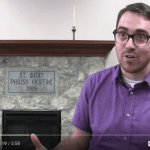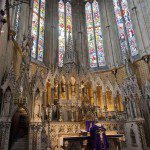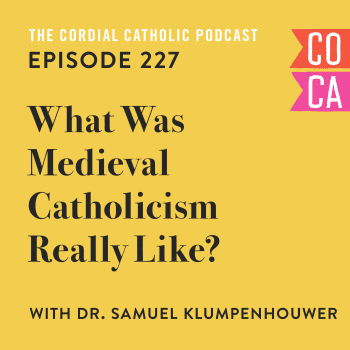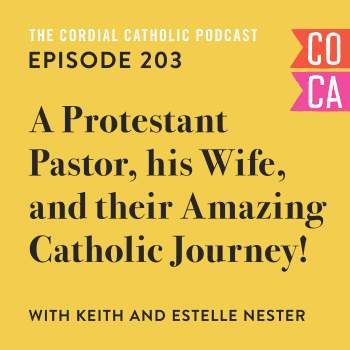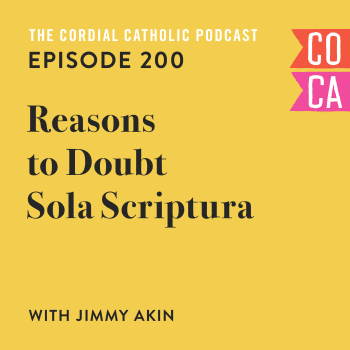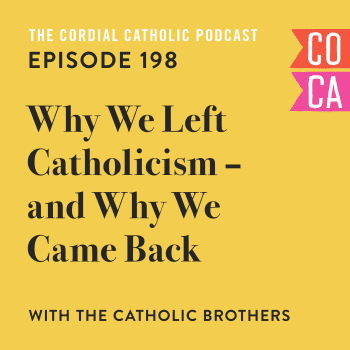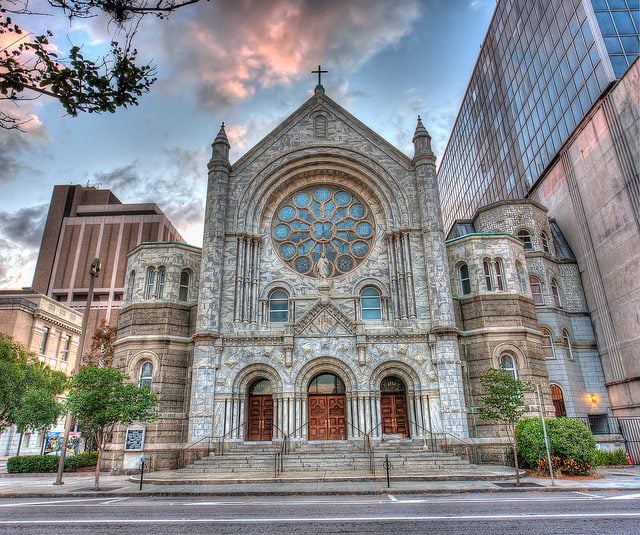
By day I’m a Kindergarten teacher. I hang out with 3 and 4-year olds and sometimes learn a little bit along the way. Sometimes they learn a little bit, too. Recently, a group of my youngest students asked where babies come from. I expertly dodged the question and, like a good educator, turned it back upon the asker,”Where were you born?” I asked a couple of them. I was surprised by their incredulous looks, like I’d ask them to explain Pythagoras’s theorem.
“I don’t know,” each one, in turn, replied. It was a question, I could tell by their faces, that they didn’t even know how to begin to process, nevermind answer.
I was surprised.
Of course, I probably shouldn’t have been. To a 3 or 4-year old the question of where they were born must seem pretty irrelevant. They were born, they exist, they’re playing cops and robbers with their friends. That’s enough.
Likewise, that was enough for me, as a Protestant, for 15 years. Since I came to Christ as a high school student up until I started exploring the roots of the Christian Church it was enough to know I was born, I existed, I was a Christian.
Once I began digging deeper into those roots, to learn about where Christianity—my faith—was born I realized, like my tiny Kindergartners, how little I knew.
I was surprised to realize that my Kindergarten students didn’t know where they were born. But, as I thought about it, I was in the exact same position in my faith life. I didn’t know where I came from—where my faith, a central part of my life and identity, had its origins.
Sure, I knew about the Reformation. I knew about the church in the New Testament. I knew, roughly, the outline of history. But I didn’t know the details, and the details are important. I never took the time, or spent the energy, to learn about where (and how) my faith was born.
Blessed John Henry Cardinal Newman, a famous Anglican convert to Catholicism in the 19th century, made a pretty audacious claim about Protestants who read into the history of the Christian Church. He said,
To be deep in history is to cease to be Protestant.
Newman was arguing that those who looked deeply into Church history, the development of the Canon of Scriptures, the development of doctrine, the Fathers of the Church, and the catalysts of the Reformation would cease to be Protestant. The alternative, in his mind, was to become a Catholic.
As I journeyed on this road towards Rome I thought it would be prudent to read some historical texts about the Reformation. After scouring the Internet for suggestions I landed on The Reformation by Diarmaid MacCulloch, a secular Scottish historian of some renown. My goal was to find as unbiased a source as possible covering the Reformation and the Catholic Counter-Reformation from a decent perspective. While MacCulloch’s own social ethics lens certainly coloured some of his commentary, The Reformation was incredibly thorough—and incredibly eye-opening.
I’ve told my Protestant friends this: If I wasn’t already on this journey towards becoming Catholic, after reading MacCulloch’s massive 864-page tome, I would find it very difficult to remain Protestant.
That’s the truth.
Because the truth is, in my reading, the Protestant movement began as a protest. A protest against corruption in the Church and its teachings but also as a product of its time.
The Church was corrupt.
What I failed to grasp as a Protestant was that the Church is the first to admit that.
The Church was doing some pretty ridiculous and those things needed to be reformed. But what started as a reform movement from within the Church quickly got out of hand.
Interesting, MacCulloch argues that if there’s any one explanation for the Reformation (and the lack of a Reformation in the Eastern Orthodox churches) was because, suddenly, Europeans could read the Bible in a new language: Greek.
In fact it was a Church emerging out of the Dark Ages and discovering biblical literature, theology, and, indeed, ancient Greek manuscripts that prompted the Reformation as much as the corruption of the Church. It was a product of the times.
Suddenly, rich theological works that had been lost were being re-read and re-discovered. Suddenly, the Bible was being made available to the average layperson thanks, first of all, to the Catholic Church. But these Bibles, and their theology, needed an interpreter and this is where the Reformation quickly got out of hand.
In fact Martin Luther himself, the father of the Reformation and the Lutheran Church, tried desperately to get the Bible back out of the hands of the Protestant faithful once the movement began to splinter. Luther, like the Catholic Church for 1500 years, realized that the Bible was good but needed to be properly interpreted and taught from. In the hands of the people it wasn’t dangerous as a revolutionary tool, it was dangerous because it couldn’t be easily understood by the uneducated and under-educated masses. Those masses, at Mass, received their instruction and education.
Of course, that was the argument of the Catholic Church since the beginning. That argument, which is a compelling one to me, remains the case today. The Church is the sole interpreter of the Holy Scriptures. We can read and study them (and we should), the Spirit can speak through them, but the gift of God is that He gave us an authority to tell us what they mean.
As I read about the Reformation I realized that what began as reform from within the Church quickly spiraled out of control. With the right combinations of personality, zeitgeist, and technology (namely, the printing press) the situation went from reforming the one, truth, catholic and apostolic church into splintering off and, early on, establishing one’s own doctrine and theology based on one’s own preference, experience, and history.
A solid argument can be made, even, for Luther’s doctrine of salvation being based strongly on his own experiences with scrupulosity as a Augustinian friar.
What shocked me most, in learning about the Reformation, was that I didn’t know where my faith was born. I didn’t know where I’d come from, or what had come before me.
I didn’t know how tenuous the start of my Protestant faith was, or how the personalities of the reformers influenced and shaped their teaching (which in turn influenced and shaped the development of today’s 30,000 denominations). Or how a translation of the Bible into the vernacular, the language of the people, affected the European population—and not because the Church had been hiding anything (or making anything up) but because it was new and different and they often didn’t understand what they read.
The Church is the first to admit that it had things wrong but the Counter-Reformation in the Catholic Church worked to set those things right.
Here, Protestant theologian, and champion of Church unity Stanley Hauerwas says it best, speaking to modern-day Protestants. He’s worth quoting at length,
Protestantism is a reformed movement. When it becomes an end in itself it becomes unintelligible to itself. Protestants who don’t long for Christian unity are not Protestant. There is also the ongoing problem that Catholics have responded to the Protestant critique in a way that the Protestant critique no longer makes much sense. Accordingly, the question is: why do we continue to be kept apart?
What I’ve learned by reading about the birth of my faith is that its birth is decidedly shaky. If Catholics have reformed themselves what is there left to protest against?
Of course not everyone who reads Church history is going to become a Catholic. Cardinal Newman’s jab at Protestant historians isn’t mean to be a cardinal rule. It’s a possible outcome, a likely outcome according to Newman. If the history of the Church were that compelling than everyone would be a Catholic, or everyone would be a Protestant, or we’d all join the Eastern Orthodox church. Newman’s argument, however, and Hauerwas brings it home, is that if we look into the reasons why the Reformation took place, the heart of the Reformation, we’d have an awfully hard time hanging on to our current paradigm.
This article is a modified version of a post which was originally published on my personal blog as A Protestant Deep in History.


